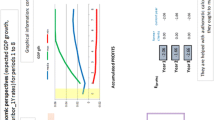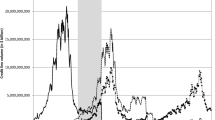Abstract
The authors offer a mathematical model for adverse selection by individual borrowers based on preferences for offers and the default (Bad) or non-default (Good) status of booked accounts. We define the condition for borrower risk and response when there is no adverse selection (NAS). This definition provides us with a direct comparison between the prior and posterior conditional probabilities of default by an individual borrower who Takes an offer; this allows us to obtain estimates of differential response rates for individual borrowers and the Good/Bad odds for Take, Non-Take and Accept sub-populations. Performance of different response-risk segments allows us to compare price-driven risk elasticity and price-driven response elasticity in the presence of Good or Bad adverse selections; a special case applies when the borrower's capacity to repay is not an issue. We offer limited experimental results for selected price-risk segments where action-based risk and response scores are used to estimate borrower preferences. The critical role of Non-Take inference is described.



Similar content being viewed by others
References
Agarwal S, Chomsisengphet S and Liu C (2010). The importance of adverse selection in the credit card market: evidence from randomized trails of credit card solicitations. Journal of Money, Credit and Banking 42 (4): 743–754.
Akerlof GA (1970). The market for ‘lemons’: Quality uncertainty and the market mechanism. Quarterly Journal of Economics 34 (3): 488–500.
Altman D, Cutler DM and Zeckhauser RJ (1998). Adverse selection and adverse retention. American Economic Review 88 (2): 122–126.
Ausubel LM (1999). Adverse selection in the credit card market. Working paper, University of Maryland, Department of Economics.
Cressy R and Toivanen O (2001). Is there adverse selection in the credit market? Venture Capital 3 (3): 215–238.
Edelberg W (2004). Testing for adverse selection and moral hazard in consumer loan markets. Finance and Economics Discussion Series 2004:1-09, Division of Research and Statistics, Federal Reserve Board: Washington, D.C.
Fahner G (2012). Estimating causal effects of credit decisions. International Journal of Forecasting 28 (1): 248–260.
Finlay S (2010). Credit Scoring. In C Cherry (ed.) Response Modeling and Insurance Rating. A Practical Guide to Forecasting Consumer Behaviour. Palgrave Macmillan: Basingstoke, pp 232–235.
Good IJ (1961). Weight of evidence, causality and false-alarm probabilities. In: Cherry C (ed). Information Theory: Fourth London Symposium. Butterworth: London, pp. 125–136.
Hand DJ and Henley WE (1997). Statistical classification methods in consumer credit scoring. JRSS. Series A 160 (3): 523–541.
Lewis EM (1992). An Introduction to Credit Scoring. 2nd edn, Athena Press: San Rafael, CA, republished by Fair Isaac & Co.
Phillips R and Raffard R (2009). Theory and empirical evidence for price-driven adverse selection in consumer lending. Columbia University Business School and Nomis Solutions, Edinburgh Credit Scoring and Credit Control Conference XI. Revised as Working Paper on 20 July 2010.
Rasmussen E (1994). Games and Information. 2nd edn, Blackwell Publishers: Oxford, pp. 223–245.
Thomas LC (2009). Consumer Credit Models. Oxford University Press: New York.
Acknowledgements
The authors are indebted to the referees, who made us think carefully about the sources and content of data that influence adverse selection. We are extremely grateful for the careful reading, comments and suggestions by Brian Bloechle, particularly his emphasis on probabilities and Bayes' factors conditioned on data rather than scores.
Author information
Authors and Affiliations
Corresponding author
Rights and permissions
About this article
Cite this article
Oliver, R., Thaker, A. Adverse selection and non-take inference with coherent risk and response scoring. J Oper Res Soc 64, 70–85 (2013). https://doi.org/10.1057/jors.2012.3
Received:
Accepted:
Published:
Issue Date:
DOI: https://doi.org/10.1057/jors.2012.3




